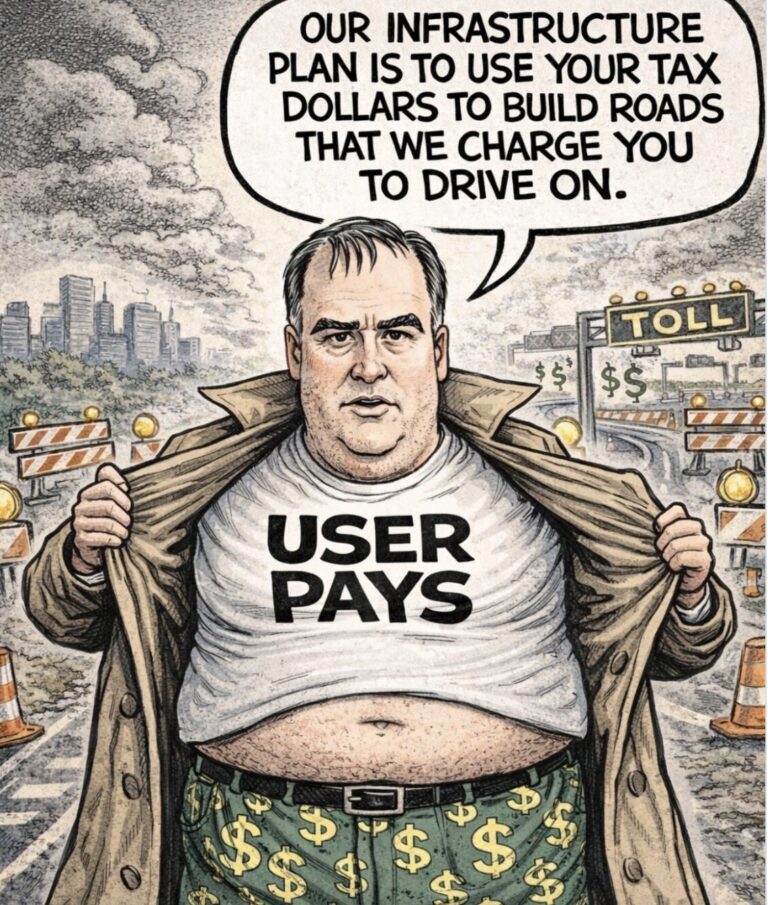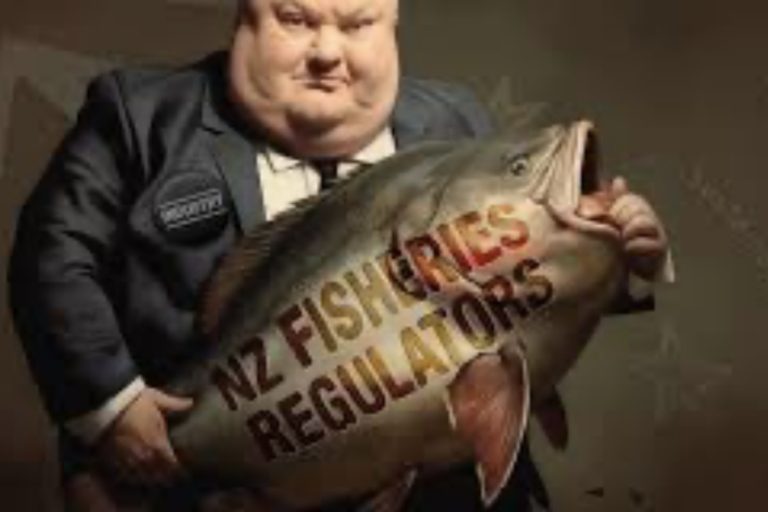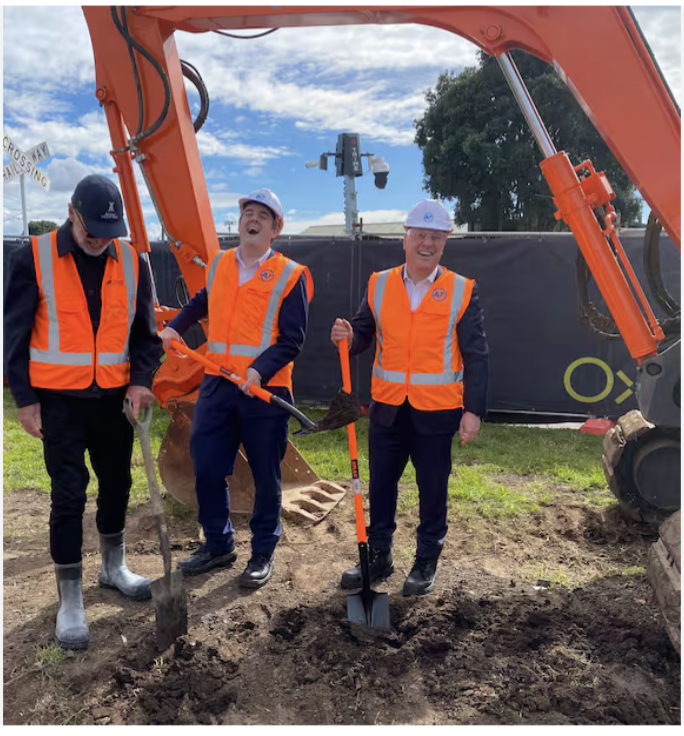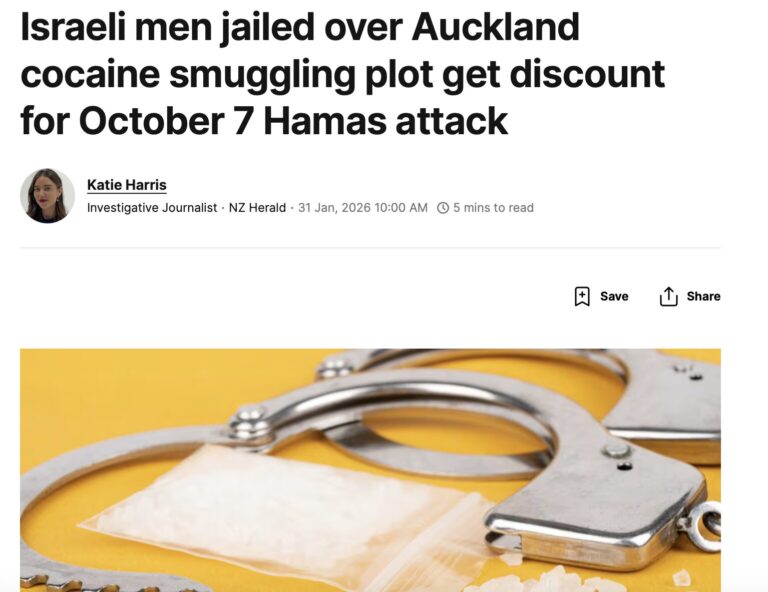NZ Farmer Culture have become feral and sectarian – unleash the climate legal war upon them!
Ever since the Taxpayers Union started plowing vast amounts of Dark Ag money into astroturf groups like Groundswell to corrupt due process daw hip up rednecks, NZ Farmer culture has become feral, sectaraoiana nd dominated by big money.
We are all seeing how Kiwis are being fucked over by Butter prices and now the latest Newsroom expose into how corporate Agriculture wrote the water rules for themselves (while conning you all that Da Maaaaaares are stealing da water)…
Who Benefits: The power of the farm lobby, part one
The proposals weren’t magicked out of thin air, of course.
Ministries for the Environment and Primary Industries met selected groups between October last year and February to float ideas and gather feedback on changes to the national policy statement for freshwater management (NPS-FM) and associated environmental standards.
Concern is now being raised about the structure and nature of that pre-consultation, and what emerged in the discussion document.
Figures provided to public health researcher Marnie Prickett and Newsroom show agricultural groups were consulted in dedicated meetings more often, and for more hours, than local government, central government agencies, and environmental non-government organisations combined.
“I’m concerned at the amount of time that these agencies have spent with the agricultural sector, given that the agricultural sector is one of the biggest polluters of our freshwater resources,” says Prickett, a research fellow at the University of Otago, Wellington’s department of public health – and a member of advocacy group Choose Clean Water.
Consultation with the primary sector spanned 34.5 hours over 24 meetings, while 18 dedicated meetings were held with agencies, councils and environmental non-government organisations. Over the pre-consultation period there were also an estimated 12 regular inter-agency meetings – held fortnightly for 30 minutes – taking the total to 31 hours.
(The most consulted sector in the target consultation was Iwi/Māori. More on that in part two.)
There’s also a skew in ministerial time.
A diary search of key ministers for official meetings, video conferences, events, and functions (including in other portfolios) spanning this parliamentary term shows 98 meetings with Federated Farmers, Beef + Lamb, Dairy NZ, and eight with environmental groups EDS, Forest & Bird and Greenpeace.
Obviously, that list excludes ministerial meetings with other groups such as the Meat Industry Association, Dairy Companies Association of NZ, Horticulture NZ, Irrigation NZ, and Fish & Game.
Prickett says agricultural groups have a commercial interest in limiting regulation. “I’m concerned that that means the Government is not operating in the public interest but rather prioritising polluting commercial interests.”
The country can have productive agriculture, she says, but within environmental limits. Prickett is concerned that diluting freshwater protections would lead to dramatically more degradation, and make it harder to reverse existing problems.
Removing these protections would, she says, be similar to decisions favouring the tobacco industry over the public interest.
…Newsroom have done us an enormous service to journalism by exposing the power of the Farmers in setting environmental legislation…
Prickett, of University of Otago, says a straight line can be drawn between what agricultural groups have asked for and what’s in the public discussion document.
A November 14 letter to ministers McClay, Hoggard, and Simmonds, written by Federated Farmers vice president and freshwater spokesperson Colin Hurst, said national bottom lines for water quality were, in some areas, “unachievable”, because of, for example, climate change, naturally occurring processes, population growth, land use, and legacy effects.
“Our recommendation is that national direction focus on what outcomes regional councils should seek to achieve, but that targets and timeframes are set at the catchment level, by regional councils, based on the social, economic, environmental and cultural needs of the local community.”
In March, after targeted consultation had finished, ministers Bishop, McClay, and Hoggard stepped in to ensure local decision-making would appear in the discussion document. The intervention was recorded in an interim Regulatory Impact Statement – in which officials assess the effects of policy changes.
The additional option was councils should be given flexibility to deviate from national bottom lines when achieving them “has a high social, cultural or economic cost”.
An interim Regulatory Impact Statement (there were several) said giving councils this flexibility “will address key concerns, including those raised in the Beef + Lamb NZ report about natural variation, and the need to vary by region”.
(Prickett, the public health researcher, says talk of local decision-making is, to her, shorthand for decisions made or influenced by polluting commercial interests.)
At the March 4 meeting, officials were also directed to add other options to the discussion document: removing Te Mana o Te Wai (a decision-making hierarchy putting the health of water and ecosystems first), or considering a name change; and scrapping the 190kg per hectare cap on synthetic nitrogen fertiliser.
Hurst’s letter from November told ministers there should be “no hierarchy of obligations” – a direct assault on Te Mana o te Wai – and asked for a refreshed NPS to balance environmental values with cultural, social and economic purposes.
The South Island’s biggest irrigation company, Central Plains Water, writing on December 2, three days after its consultation meeting, said many of the problems arising from the national policy statement stemmed from “how Te Mana o te Wai is framed”. The hierarchy needs “replacing in its entirety”.
The company supported locals deciding if water quality and quantity should be maintained or improved, with the caveat: “It is based on clear direction set in a NPS”. Directions on nutrient management “do not need further strengthening”, the company said.
However, officials noted there would also be an increased risk of “debate and litigation”.
Another passage of the regulatory impact statement quoted a Beef + Lamb report. “There is also concern from the primary sector that it is not possible to meet water quality bottom lines within the timeframes anticipated to be set, and ‘trying to meet them will decimate farming and rural communities’.”
…The Government does whatever their Farmer mates want, damn the environment and Māori interests in water!
The polling numbers don’t lie, Farmers are culturally sectarian in their allegiance to the polluters and they will never, ever, ever change…
How would farmers vote if an election were held today? The results might surprise you
-
- National:54%
- ACT:19%
- NZ First:8%
- Labour:3%
- Greens:2%
- Te Pati Māori:1%
- Other:1%
- Unsure:12%
…THEY CAN NOT BE NEGOTIATED WITH!
They are sectarian!
Labour foolishly (enabled by James Shaw) tried to cut deals with Farmers and Farmers turned and shat in our face!
Dark money from the agricultural industry soaks into the astro-turf Taxpayer’s Union stable of clients and enables Groundswell to stop any environmental improvements.
National disgracefully appointed a Dairy Industry Stooge as the Chief Scientist while bring back the 100% Pure greenwash tourism campaign!
Just consider the manner in which Corporate Dairy have seized control of NZ’s political right…
The Climate Change Commission recommends methane cuts of 35-47%. However, under pressure from lobby groups like Federated Farmers – whose ex-President Andrew Hoggard is now an ACT Party MP – the Government established a separate panel to review the methane target in line with this controversial tool. That panel landed on a much weaker methane target.
Larsson says, “The Luxon Government chose to sideline its independent, science-based climate advisory body by setting up a separate review panel with the very narrow task of giving it the answers it wanted. No wonder international climate scientists are raising the alarm.”
Further OIA documents show that the Methane Review Panel only met with agribusiness stakeholders, including a Groundswell-linked lobby group.
Greenpeace says this is just the tip of the iceberg. The organisation has unveiled documents showing the startling level of influence that groups like Federated Farmers, Dairy NZ and Beef+Lamb NZ have had over government policy. This includes writing draft policy and communications plans for Ministers.
…consider the criticisms of Professor MacCulloch…
Perhaps the most under-explored aspect of MacCulloch’s critique is his consistent condemnation of corporate New Zealand’s underperformance. He argues that the real drag on New Zealand’s productivity isn’t just government bureaucracy, but the incompetence of private sector leadership.
Business is too focused on getting either special legislative deals from the government of the day, or else corporate subsidies from the taxpayer. According to MacCulloch, the last Government’s Covid Wage Subsidy Scheme was a giant transfer of $18bn to some of the wealthiest businesses in the country, most of whom didn’t need it.
Pointing to the stagnation of the NZX50 and the dismal share performance of dominant companies like Fletcher Building and Air New Zealand, he suggests that cushy directorships and an old boys’ club mentality have entrenched mediocrity.
…this total policy capture by polluter interests is the reason we are being attacked on the global stage by International Climate Scientists…
Scientists accuse New Zealand and Ireland of trying to cover up livestock emissions
Leading climate scientists have accused politicians in New Zealand and Ireland of using an “accounting trick” to back their sheep and cattle industries, warning their support for methane-emitting livestock could undermine global efforts to fight climate change. In an open letter shared with the Financial Times, 26 climate scientists from around the world warned that New Zealand’s proposed new methane targets risk setting a dangerous precedent.
…that’s right!
The Corporate Dairy industry has spent millions donating to National and putting dark money into Right Wing astroturf organisations to shut down any meaningful climate emissions targets that the rest of the world has noticed the policy corruption and are now calling us out.
We are being attacked internationally for being a climate criminal all because National refuse to stand up to their Corporate Dairy interests.
The Carbon Capture ‘technology’ that National have banked all our emission offsets on doesn’t work…
Carbon capture: Pivotal project for cutting greenhouse gas emissions looks shaky
A critical part of the government’s plan for cutting greenhouse gas emissions over the next five years appears to have fallen over.
…and in the last budget National cut 50% to climate finance, barely any cuts to emissions, all while slashing foreign aid for our Pacific brothers and sisters by cutting climate aid by $100m.
This Government is a Climate Denial Government who are refusing to do anything about the coming adaptation because they are paid by the polluters.
So how does the Left respond?
Let them hang!
World’s highest court sends shot across bow of NZ’s climate policy
A landmark ruling from the International Court of Justice has found increasing fossil fuel production could breach international human rights law, said all nations must tackle climate change even if they are not parties to the Paris Agreement, and renders polluting states responsible for climate reparations.
The advisory opinion, released early Thursday morning at the court’s headquarters in The Hague, had the unanimous support of all 15 justices. Legal experts said it had serious implications for developed countries’ climate policies, including New Zealand’s.
“It’s an incredibly powerful and important judgment. It’s the first time the ICJ, one of the world’s highest courts, has clarified states’ obligations on climate change. This has a particular importance and relevance for New Zealand and it raises real questions around whether New Zealand’s climate approach actually accords with what’s required of us under international law,” Jessica Palairet, executive director of Lawyers for Climate Action New Zealand, told Newsroom.
…radical legal punishment for climate change is coming and there’s nothing these Right wing Farmers are going to be able to do to stop it!
Fonterra have desecrated their social contract with us by forcing us to pay the same price as 500 million middle class Chinese!
They pollute our environment while price gouging us!
LOOK AT THOSE NUMBER AGAIN
- National:54%
- ACT:19%
- NZ First:8%
- Labour:3%
- Greens:2%
- Te Pati Māori:1%
- Other:1%
- Unsure:12%
You can’t negotiate with a sectarian culture like that, Federated Farmers thought they were being clever promoting this poll, what they have in fact shown us is the Farming community are slaves to the polluters interests and will never ever take their climate change obligations seriously.
Send in the lawyers, use the law to force the polluters to change, no more negotiations!
When they have been broken and aren’t such arrogant pricks, THEN we negotiate with them, until then, let ’em hang!
Increasingly having independent opinion in a mainstream media environment which mostly echo one another has become more important than ever, so if you value having an independent voice – please donate here.







How much butter does the average family consume in a week .Even if it was 4 blocks that means your $10 out of pocket compared to a year ago .One less coffee one less beer or use some of the dollars saved on mortgage costs and all good .Fonterra and farmers making heaps of money and paying tax to support the country and loads of buttered toast to enjoy for the people .
The problem with NZ environment laws is that they have been captured by the legal profession.
It does not benefit the public interest or the environment to blow large amounts of money on courtroom theatrics.
The solution to agribusiness overreach is mitigation, not litigation. If the net effect of agricultural irrigation takes is the nitrify bore water, the cost of mitigating that naturally falls to the folk responsible – not councils or ratepayers.
We don’t want to stick it to the cockies – just have them clean up their mess.
The history of NZ’s decarbonisation efforts has already proved that Federated Farmers contribution to the debate are not offered in good faith.
While we have 10 farmers inside the current government there will only be backwards movement .
Totally true, GW.
Together with backwards movement out the cows backsides directly into our once-upon-a-time 100% pure waterways.
The international markets won’t buy our bullshit forever; these polluters need to sort their shit.
Follow the money is an appropriate description of how this government works. They don’t care about the future and we suffer the consequence.
We will get those magic RBNZ interest rate cuts and reduce agricultural emissions the minute the foot & mouth virus re-emerges in this 100%BS country.
It would also temporarily wreck our economy, but sweet Jesus – it’s already getting well wrecked by this current bunch of shortsighted CoCs.
Yes they are very lucky that Jacinda decided to eliminate the mico bovis plasma out break that would have been as bad as foot and mouth had she decided to get stuck in and eliminate it .The ungreatful milk and beef farmers have forgotten already how they were pleading for help and how the taxpayer saved their backsides .All those beef and dairy farms would be abandoned now had she turned her back and walked away .
Mycoplasma Bovis.
No it wouldn’t have caused abandoned farms, most of the world lives with it.
It was very traumatic for farmers affected having herds culled.
Not a vote or friend winner.
But I’ll meet you half way by acknowledging the shoddy farmer biosecurity under the Nats that let the bug in, and labour had a chance to eradicate that they took.
It was messy though and pretty sad.
A short history lesson for brainless Bob and the rest who will try and defend National.
Notice how everyone is complaining about energy prices, the cost of butter and crumbling water infrastructure?
Well, the Key government sold half of our power generators meaning they pay out dividends instead of increasing capacity and security of supply.
And $500 million of the money raised by the sale went into providing water to a small number of farmers and thousands of cows. Not better water infrastructure for us.
And now those same farmers gouge us for dairy products.
Now New Zealanders are, on the whole, thick as shit but I think even a child could understand the connections between the above historical facts.
But not Bob and co…
Cinder, the moaners could stop buying butter and live longer. However I agree, a lot of the problem is a direct result of previous governments including Key’s.
TDB has previously identified that it’s the 100 biggest corporation polluters in the world we should be campaigning against. I agree. Let’s start with them. NZ farmers are small fry.
Our farmers aren’t ”small fry” when they fill our water supplies with nitrates and E. coli.
People have died or suffer life-long health issues from the dairy runoff pollution.
100% Pure? My arse.
But Ximon, stay on topic, NZ farmers could be completely carbon free and environmentally friendly and it will change nothing. They are very minor players. Oil companies aren’t. See the difference?
Let’s follow the old axiom – Think globally, act locally. The lack of that means just looking away at the problem elsewhere rather than attending to the task of our own difficulties and degradation. You think it is better to have a cargo culture waiting for some big person/corpse to come and fix our own small problems for us do you?